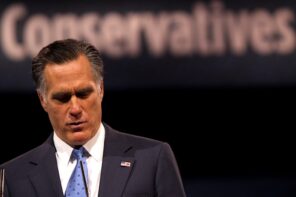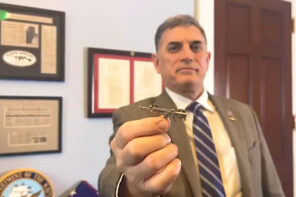Contemporary conservatism is home to an odd mix of pundits and personalities, from Bible-thumping social conservatives to blue-blooded economic elites, to assorted others who pledge to serve both God and mammon with equal fervor. For many progressives, the tensions and contradictions at work within movement conservatism make its practitioners difficult to understand, or even hypocritical. According to a new book by Michael J. Lee those tensions and contradictions have been frustrating for conservatives too.
In Creating Conservatism, the Associate Professor in the Department of Communication at the College of Charleston, traces the evolution of American conservatism across the middle of the 20th century, analyzing the notable books and authors that ushered the movement to national prominence and political power.
RD’s Eric C. Miller spoke with Lee about his project.
Your book tells the story of movement conservatism as an internal struggle between two opposed factions—traditionalists and libertarians. The first faction values religious belief and social order, while the second is primarily concerned with individual freedom. Over a few decades of antagonism, the two became fused. How do you evaluate the state of the movement currently? Is the struggle ongoing?
In my judgment, the history of the American conservative movement suggests its adaptability and flexibility. It is certainly possible that one faction or the other could take hold of conservatism and drive out the rest, but, in the main, conservatives, both historically and in our present political circumstances, have accepted a fusion of Christian morality and free market economics as their bedrock beliefs.
There is a great deal of room to maneuver between these poles, which allows conservative campaigners to emphasize a more socially conservative platform or a more libertarian conservative platform depending on the circumstances. I don’t mean to suggest that conservatives’ adaptability sets them up to win in 2014 or even 2016, but I do take issue with those pundits, and there are many, who have argued that conservatism is a “dead” ideology.
You identify “fusionism” as a concerted strategy to unite the factions into a viable coalition. It seems to me that, lately, conservative arguments themselves have become fused. The prevalence of “religious liberty” complaints, for instance, seems to cast traditionalist commitment in libertarian language. Do you buy that interpretation?
That’s an astute point. “Religious liberty” is a perfect example of fusionist rhetoric and fusionist ideology. After Reagan succeeded so dramatically with a fusionist “God and markets” message, there have only been a few non-fusionist conservatives to gain much national traction. Pat Buchanan’s 90s-era culture warriors are one example; although, by my reading, it remains to be seen whether Rand Paul’s ideological adjustments will bring him closer to standard fusionism. His father’s more stridently libertarian message, which rankled the feathers of social conservatives, is another. There are certainly more, but these are exceptions to the fusionist rule.
“Religious liberty” is an illustrative phrase for another reason as well: the threat of fracture. Hardline libertarians of Ludwig von Mises’ or Ayn Rand’s ilk found phrases like religious liberty revolting because they urged the freedom to practice a religion that itself denies individual freedom. In fact, I’ve been consistently amazed at how well fusionists have done in managing what I see is the inherent tension between a morality chiefly based on individual freedom and market processes, and one grounded in Judeo-Christian values.
Fusionists like Frank Meyer insisted that people who saw these as contradictory were wrong, that market-based values and religion-based values actually required one another for legitimacy. That is, freedom required religion’s ethical guidance, and religion required a defense of freedom to avoid theocracy.
Fusionism’s success was, however, more due to its ability to fashion resonant appeals to lots of constituencies than to its uncomplicated synthesis of mutually dependent ideologies. After all, I have never seen an effective answer to the question hardline traditionalist Brent Bozell posed to early fusionists in the 1960s: freedom or virtue? Is it more important to exercise freedom of choice regardless of the moral outcome, or is it more important that an individual’s choices align with traditional moral dictates?
Some scholars have suggested that liberal arguments, such as those touting rights and freedoms, are politically useful for hardline religious candidates because they allow them to appear mainstream—interested in freedom as well as virtue. Do you see the tension between freedom and virtue as a philosophical dispute, or is it more of a pragmatic matter? That is, in your view, does the debate hinge more on principle, or electability?
I agree wholeheartedly with your point about how touting rights and freedoms can soften the rhetoric of even the most traditionalist—perhaps theocratic—candidates. If memory serves, there was actually a great Daily Show segment on this very point during the 2012 election where John Oliver accused Rick Santorum of missing this particular memo on how to dial back his didactic religious rhetoric.
The easy (but also the right) answer to your question is that both principle and electability spur the intra-conservative debate over freedom vs. virtue. In fact, in chapter 4 of Creating Conservatism, I argue that what is an inevitable collision between freedom and virtue as co-equal philosophical values, affords conservatives who find comfort in or look past this tension a range of argumentative resources. In brief, this collision allows for a more robust and philosophically diverse movement. A few quick illustrations should help demystify this potentially esoteric point.
In 2000, lots of conservative candidates, George W. Bush in particular, employed a thoroughgoing religious rhetoric to appeal to voters who had been particularly disaffected by, shall we say, the perceived moral flexibility of the Clinton White House. In 2004 and 2006, lots of conservative candidates argued that we needed a substantial military presence in Iraq and Afghanistan to safeguard the freedoms of both Americans and the wider world. In 2010 and beyond, conservative candidates have employed a different notion of freedom, one that has absolutely nothing to do with serving the government (or military) or the public to preserve someone else’s freedoms.
All of these are essentially conservative arguments; they are all in the wheelhouse of the conservative movement. These adjustments of emphasis, nevertheless, are made possible by the deeper philosophical contradiction between the fusionist claim to hold freedom and virtue as co-equal values.
To be clear, I am not suggesting that conservative candidates in 2000 didn’t also talk about freedom or that more economically focused conservative candidates in 2012 or even 2014 don’t wrap themselves in their religious faith. It is, rather, a matter of emphasis, and a vital one at that.
When I spoke with Leslie Durrough Smith about her book, she made the same observation about the flexibility of conservatism—that it provides adherents with a wide range of adaptable arguments. Most people don’t notice the adaptation, because they think of conservatism as the ideology of stability or fidelity to the past. I wonder if this isn’t a real misconception, because it’s often unclear to me what exactly is being conserved. Having completed this book, do you see the movement “standing athwart history yelling stop,” in William F. Buckley’s phrase, or is it just progressive in a different sense?
Much of my book can be read as a history of conservatives debating about the meaning of conservatism. Some, like Russell Kirk, Richard Weaver, Robert Nisbet, Eric Voegelin, and others, were conservationists. Some, like Friedrich Hayek, Milton Friedman, and, to a lesser extent, Barry Goldwater, didn’t have much use for social tradition. Since I’m committed to the idea that conservatism is adaptable and that these, sometimes significant, adaptations arise from contradictory political and philosophical commitments, I think conservatism has been aided by its rich postwar history of both conservationists and capitalists. Hayek, in fact, insisted that his embrace of capitalism disqualified him from conservatism because markets were inherently mobile and unstable with cruel regard for goods or practices that were no longer useful or profitable.
So what were the—pardon the mouthful—conservationist conservatives conserving? Although the answer varies a bit depending on the traditionalist advocate, there are a few key common themes in their work: Judeo-Christian civilization, the nuclear family structure, social hierarchy, and private property.
These are obviously pretty loaded terms with a potential litany of meanings, but if you try to look at the modern, mechanical, destructive world of the 1940s and 1950s, as Kirk or Weaver did, and then imagine why both were fond of the rigid social orders of both medieval Europe and the antebellum South, it isn’t hard to come up with some clearer ideas about what they wanted to conserve. Then again, Whittaker Chambers, who later abandoned conservatism as a political identity in favor of calling himself a “man of the right,” thought these feudal longings were ridiculous because America’s main social and political traditions weren’t feudal at all.
Buckley plays an intriguing, often vexing, role in this debate over the meaning of conservatism. His “Publisher’s Statement” that opened the first issue of National Review in 1953 was the boldest and briefest statement of the values of upstart conservatism to date. Enchanting and provocative as it was, the statement, especially when coupled with Buckley’s later claim that he was a “revolutionary,” doesn’t settle whether conservatism fixed its sights on the past or a new political future. Conservatives read it both ways depending on their own politics.
Even Buckley’s newly heroic conservative who yells “Stop” at history can be read both ways. If, as Buckley implies in the statement, the New Deal was a perversion of sacred American political values, then is bold action to recover past political traditions properly called conservative in the Burkean sense or revolutionary in the Jacobin sense?
One thing I discovered about the history of American conservatism is that the danger of slipping into a rabbit hole of semantic dispute and terminological confusion always looms. In the end, the meaning of conservatism is made, in part, by how conservatives practice conservatism, not in fixed categories about what is essentially left or right, conservative or liberal.
This interview has been edited for length and clarity.





